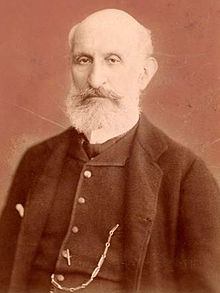Carlo Pedrotti

- photograph by Antonio Bertulli
Carlo Pedrotti (12 November 1817 – 16 October 1893) was an Italian conductor, administrator and composer, principally of opera. An associate of Giuseppe Verdi's, he also taught two internationally renowned Italian operatic tenors, Francesco Tamagno and Alessandro Bonci.
Early life
Pedrotti was born in Verona, where he studied music with the composer Domenico Foroni.[1] He composed two operas which were never performed, but his opera semiseria Lina was successfully given at Foroni's Teatro Filarmonico in 1840, and his next opera, Clara di Mailand, was performed there later that year. This was followed by four seasons as conductor of the Italian Opera in Amsterdam, where a further two operas were composed and premiered.[2]
Operatic success
He returned to Verona in 1845. During the next 23 years, he taught, conducted at the Teatro Nuovo as well as the Teatro Filarmonico and composed a further 10 operas. Fiorina (1851), another opera semiseria, was a success in Italy and beyond, and the commedia lirica Tutti in maschera (1856), his best-known work, was later taken up in Vienna and Paris.[2] It has been successfully revived in recent years in Savona, Piacenza and Rovigo and at the Wexford Festival.[3]
Turin and Pesaro
In 1868, Pedrotti moved to Turin, where he had been appointed director of the Liceo Musicale and conductor and director of the Teatro Regio. At the Liceo, his pupils included the composer and orchestral musician Raffaello Squarise and the heroic tenor Francesco Tamagno, who later created the title role in Verdi's penultimate masterpiece, Otello.[4] At the Regio, as well as improving the quality of opera performances, he inaugurated a series of popular concerts.
Following the death of
Pedrotti composed only two operas while in Turin, both near the beginning of his tenure. They were Il favorito (1870) and Olema la schiava (1872). The turned out to be his last operas.
During his 14 years in Turin, the Teatro Regio became one of the most important
In 1882, Pedrotti moved to Pesaro as the first director of the Liceo Musicale, for the foundation of which Rossini had left money in his will. Among his students there was the young Alessandro Bonci, who went on to achieve a career as a prominent lyric tenor in Europe and America. He organised the Rossini Centenary celebrations in 1892 but he retired to Verona, citing ill-health, in 1893. In October of that year, he committed suicide by drowning in the Adige.[2]
List of operas by Pedrotti
| Year staged | Name of work | Type of work | Librettist |
|---|---|---|---|
| unstaged | Antigone | opera seria | Marco Marcelliano Marcello |
| unstaged | La sposa del villagio | opera semiseria | Marco Marcelliano Marcello |
| 1840 | Lina | opera semiseria | Marco Marcelliano Marcello |
| 1840 | Clara di Mailand | opera seria | |
| 1841 | Matilde | opera seria | |
| 1844 | La figlia dell'arciere | opera semiseria | Felice Romani |
| 1846 | Romea di Montfort | opera seria | Gaetano Rossi |
| 1851 | Fiorina, o La fanciulla di Glaris | opera semiseria | L Serenelli Honorati |
| 1852 | Il parrucchiere della reggenza | opera comica | Gaetano Rossi |
| 1853 | Gelmina, o Col fuoco non si scherza | opera semiseria | Giovanni Peruzzini |
| 1854 | Genoveffa del Brabante | opera seria | Gaetano Rossi |
| 1856 | Tutti in maschera | commedia lirica | Marco Marcelliano Marcello |
| 1859 | Isabella d'Aragona | opera seria | Marco Marcelliano Marcello |
| 1861 | Guerra in quattro | opera buffa | Marco Marcelliano Marcello |
| 1861 | Mazeppa | tragica | Achille de Lauzières |
| 1865 | Marion Delorme | opera seria | Marco Marcelliano Marcello |
| 1870 | La vergine di Kermo[6] | melodramma romantica | Francesco Guidi |
| 1870 | l favorito | tragedia lirica | G Bercanovich |
| 1872 | Olema la schiava | opera seria | Francesco Maria Piave |
References
- ^ Biography of Foroni (in Italian) Archived 2009-12-12 at the Wayback Machine
- ^ ISBN 978-0-19-522186-2.
- ^ Wexford Festival Opera Programme-book, 2008
- ISBN 0-19-869164-5
- ^ Casaglia, Gherardo (2005). "Carlo Pedrotti". L'Almanacco di Gherardo Casaglia (in Italian).
- ^ A pasticcio, with music by Pedrotti, Amilcare Ponchielli, Giovanni Pacini, Antonio Cagnoni, Alberto Mazzucato, Francesco Cortesi, Lauro Rossi, one or both of the Ricci brothers, and others
